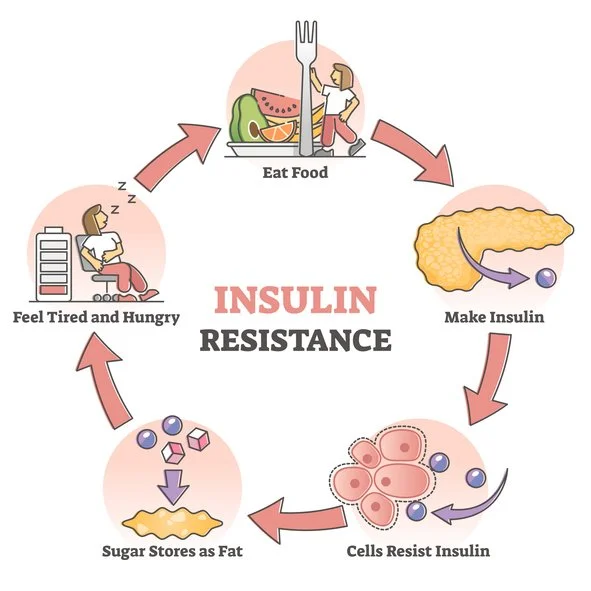Processed Carbs, Insulin and Mitochondrial Health: Why We Are obese and Exhausted
Mitochondria
Mitochondria are tiny structures in our cells that produce energy. They are like tiny power plants. When these power plants are not healthy, it can lead to various health problems. One way to tell if the mitochondria are not healthy is if they start breaking into smaller pieces. This can happen when the balance between two processes called fission and fusion is disrupted. When there is too much fission, the mitochondria can break apart and not work properly. This can lead to fatigue and even more serious health problems. So, it's important to keep the mitochondria healthy and prevent them from breaking apart too much.
Insulin
Recent studies have shown that insulin is not only important for regulating glucose levels, but also plays a significant role in maintaining healthy mitochondria, particularly in terms of fission. New research suggests that insulin spikes, which often occur after consuming processed carbohydrates, can increase the activity of two substances, RalA and Drp1, leading to the fragmentation of mitochondria. This process highlights a key mechanism through which dietary choices can impact metabolic health and the risk of obesity. The condition has traditionally been called insulin resistance. Read this post and this post if you are interested in finding out more about how insulin and processed carbohydrates affect our health.
Processed Carbs
Processed carbohydrates are known for their quick conversion into glucose, which results in a sharp rise in the level of insulin in the body. This insulin spike activates a protein called RalA, which plays a crucial role in many cellular functions, including the regulation of mitochondrial dynamics. When RalA's activity is increased, it interacts with another protein called Drp1, which is vital for mitochondrial fission. This interaction promotes the fragmentation of mitochondria, which impairs their ability to oxidize fats effectively. This, in turn, leads to reduced energy expenditure, weight gain, and insulin resistance.
Modern Diets and Obesity
The link between processed carbohydrates and mitochondrial dysfunction provides a strong argument for reconsidering our dietary habits. Processed carbohydrates are found in many modern diets and not only increase insulin levels but also interfere with mitochondrial integrity, leading to metabolic disturbances. These foods are frequently consumed and cause chronic insulin elevation, which in turn creates a cycle of metabolic inefficiency and weight gain.
What You Can Do
Based on current understanding, a diet that limits processed carbohydrates appears to be a sensible approach to maintain metabolic health. Remember, one bagel will spoke blood sugar equivalent to fourteen teaspoons of sugar! By reducing the consumption of processed carbohydrates, insulin levels can be controlled, which prevents the excessive activation of RalA and subsequent mitochondrial fragmentation. As a result, a diet low in processed carbohydrates can promote stable insulin levels, leading to healthier mitochondrial dynamics that are characterized by less fission. This shift not only enhances the mitochondria's fat-oxidizing capacity but also contributes to an overall improvement in metabolic health and a lower risk of obesity-related complications.
Conclusion
In essence, the relationship between insulin spikes, RalA activation, and mitochondrial health illuminates the profound impact of dietary choices on our metabolic well-being. Embracing a diet that focuses on whole foods and minimizes processed carbohydrates and industrial seed oils like soybean oil and includes animal -based foods with its fat offers a tangible means to support mitochondrial integrity, ensuring a more efficient metabolism and fostering long-term health and vitality.
Optimizing mitochondrial function is pivotal for enhancing energy levels, improving metabolism, and boosting overall health. Key strategies include engaging in regular physical exercise, particularly high-intensity interval training (HIIT), which can increase mitochondrial density and efficiency. A balanced diet rich in antioxidants, such as vitamins C and E, omega-3 fatty acids, and other nutrients found in whole foods, can protect mitochondria from oxidative stress. Intermittent fasting or caloric restriction can also promote mitochondrial biogenesis, the process by which new mitochondria are formed, thus improving their function. Additionally, ensuring adequate sleep and managing stress are crucial for maintaining mitochondrial health, as both inadequate sleep and high stress levels can negatively impact mitochondrial function. Incorporating supplements like Coenzyme Q10, which is involved in electron transport and energy production within mitochondria, may provide further support. By adopting these lifestyle and dietary habits, one can significantly enhance mitochondrial efficiency, leading to improved energy levels and overall well-being.
Source:
Xia, W., Veeragandham, P., Cao, Y. et al. Obesity causes mitochondrial fragmentation and dysfunction in white adipocytes due to RalA activation. Nat Metab 6, 273–289 (2024). https://doi.org/10.1038/s42255-024-00978-0





